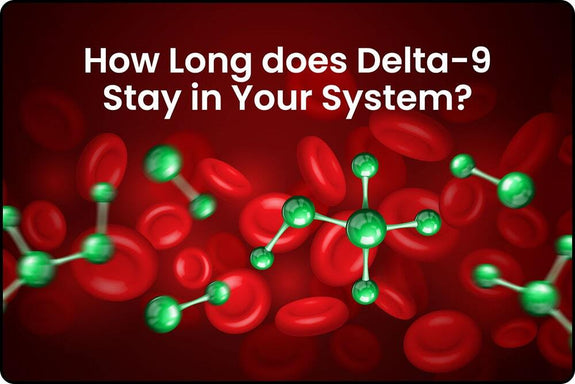How Long Does Delta Nine Stay In Your System

The growing acceptance and legality of Delta-9 THC products across numerous states have sparked increased interest and, crucially, increased scrutiny regarding their effects. While users explore the recreational and potential therapeutic benefits, a critical question looms large: how long does Delta-9 THC stay in your system? The answer isn't straightforward, impacting everything from employment drug testing to personal decision-making.
Understanding the detection window of Delta-9 is paramount. This article delves into the factors influencing how long Delta-9 THC, the primary psychoactive component of cannabis, remains detectable in the body. We will explore the science behind its metabolism, the variables affecting its persistence, and the implications for individuals subject to drug testing.
Understanding Delta-9 THC and Its Metabolism
Delta-9-tetrahydrocannabinol (Delta-9 THC) is the chemical compound primarily responsible for the psychoactive effects of cannabis. When consumed, Delta-9 THC is absorbed into the bloodstream and distributed throughout the body, including the brain, where it interacts with cannabinoid receptors.
The body metabolizes Delta-9 THC into various metabolites, the most significant of which is 11-hydroxy-THC. This metabolite is also psychoactive and contributes to the overall effects of cannabis. Eventually, 11-hydroxy-THC is further metabolized into THC-COOH, a non-psychoactive metabolite that is stored in body fat and gradually released over time.
This gradual release of THC-COOH is what makes Delta-9 THC detectable for extended periods, particularly in urine and hair follicle tests.
Factors Influencing Detection Time
Several factors influence how long Delta-9 THC remains detectable in the system. These variables contribute to the wide range of detection windows reported in scientific studies and anecdotal evidence.
Frequency and Dosage
The frequency and dosage of Delta-9 THC consumption are primary determinants of detection time. Regular, heavy users of cannabis will typically have longer detection windows than infrequent, low-dose users.
This is because THC-COOH accumulates in body fat with repeated exposure, leading to a higher concentration and prolonged release.
Metabolism and Body Composition
Individual metabolism plays a crucial role. People with faster metabolisms tend to process and eliminate Delta-9 THC and its metabolites more quickly.
Body composition, specifically body fat percentage, also matters. THC-COOH is stored in fat, so individuals with higher body fat percentages may retain the metabolite for longer periods.
Hydration and Exercise
While drinking plenty of water can help flush out some toxins, it has a limited impact on THC-COOH stored in fat. Exercise can potentially release THC-COOH from fat cells, leading to a temporary increase in detectable levels.
However, regular exercise could contribute to a faster overall metabolism and eventual elimination of the metabolite.
Testing Method
The detection window also depends heavily on the type of drug test used. Different tests have varying sensitivities and can detect Delta-9 THC and its metabolites for different durations.
Here's a breakdown of common testing methods and their approximate detection windows:
- Urine Test: Most common and typically detects THC-COOH for 3-30 days after last use, depending on frequency.
- Blood Test: Detects Delta-9 THC for a shorter period, usually 1-2 days after last use. Primarily used to detect recent use or impairment.
- Saliva Test: Detects Delta-9 THC for approximately 24-72 hours after last use.
- Hair Follicle Test: Offers the longest detection window, potentially detecting Delta-9 THC for up to 90 days. Detects chronic use rather than recent use.
Legal and Employment Implications
The detection of Delta-9 THC has significant legal and employment implications, particularly in regions where cannabis remains illegal or where employers have strict drug-free workplace policies. Many employers utilize drug testing, particularly urine tests, to screen for cannabis use.
Positive test results can lead to job loss, denial of employment, or other disciplinary actions. It's crucial for individuals to understand the potential consequences of Delta-9 THC consumption in relation to their employment status and legal obligations.
Even in states where cannabis is legal, employers may still enforce drug-free workplace policies. Navigating these complexities requires careful consideration and awareness of local laws and company policies.
Future Research and Perspectives
Further research is needed to fully understand the long-term effects of Delta-9 THC and its metabolites, as well as the impact of varying consumption methods. As cannabis laws evolve, there is a growing need for standardized testing methods and more nuanced approaches to drug testing in the workplace.
The current "one-size-fits-all" approach to drug testing can be problematic, as it does not account for individual differences in metabolism, frequency of use, or the potential for medical cannabis use. Some argue for alternative testing methods that focus on impairment rather than simply detecting the presence of THC-COOH.
Ultimately, a balanced approach is needed that protects public safety while respecting individual rights and acknowledging the evolving landscape of cannabis legalization. More research, better education, and thoughtful policy changes are essential to navigate this complex issue effectively.
Conclusion
The question of how long Delta-9 THC stays in your system doesn't have a simple answer. It depends on a multitude of factors, including frequency of use, metabolism, body composition, and the type of drug test administered. Understanding these variables is crucial for individuals making informed decisions about Delta-9 THC consumption, particularly in relation to employment, legal obligations, and personal health.
As research continues and cannabis policies evolve, a more nuanced and informed approach to Delta-9 THC detection is essential. A focus on impairment, rather than simply the presence of metabolites, could offer a more equitable and effective solution for balancing individual rights and public safety.


















